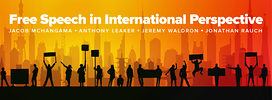Lead Essay
Jacob Mchangama describes what he terms a “cross-fertilization of censorship,” in which regimes both free and unfree are in the process of copying one another’s restrictions on expressive freedoms. More liberal countries still frequently restrict hate speech, while less liberal ones use those restrictions to justify still more restrictive acts. The world’s centuries-long march toward freedom of expression seems to have halted. Can it be restarted?
Response Essays
Anthony Leaker characterizes the recent free speech “crisis” as mythical. It is the product of far-right and indeed fascist propaganda, and we can know that this is so by observing the purported victims in the “crisis:” They are right-wing, successful, and absolutely not being persecuted. Indeed, they dictate the terms of present-day debate, exactly as people like them have always done. In this way, Leaker denies that the United States has been, or is, a force for liberty at all. Political speech does well when it liberates the oppressed, but the type of speech under discussion here is nothing of the kind.
Is free speech in danger? Jeremy Waldron sounds a skeptical note, and he offers a series of challenging methodological questions regarding how to think about free speech and public policy. Among others, he urges that we pay more attention to the difficult problems of cross-country comparisons and the interaction between law and private social sanction.
Jonathan Rauch urges a reconsideration of what social media are: Rather than neutral conduits for the ideas of others, social media platforms should be thought of as publishers in their own right. Everyone in the publishing industry knows the value of an editor, who helps to weed out low-value content. But the law has relatively little to offer the editing process, and politicians today seem increasingly determined to erode not only free speech norms, but other norms of democracy as well.
The Conversation
Coming Up
Conversation through the end of the month.
Related at Cato
Cato Unbound: “Is Social Media Broken?” December 2017
Cato Unbound: “Free Speech on College Campuses,” January 2016
Policy Forum: “What Europe Can Teach the United States about Free Speech,” April 18, with Jacob Mchangama
Book Forum: The Tyranny of Silence, with Fleming Rose and Jonathan Rauch, November 13, 2014

